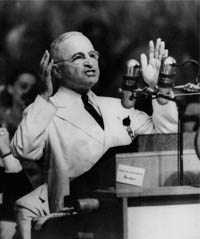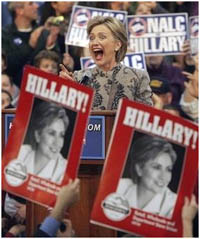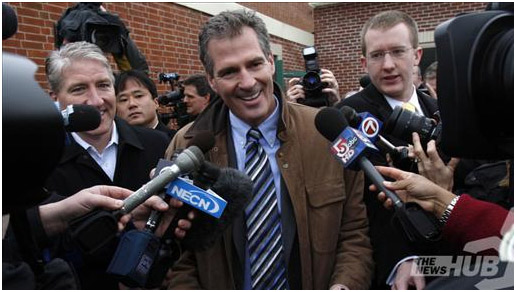Here’s a thought: What if Harry Reid isn’t in a fight for his political life? What if Hispanics actually like Meg Whitman and vote for her en masse? What if voters this Tuesday don’t throw the bums out and decide to keep the status quo?
The polls, pundits, and political projections could all be dead wrong. After all, it’s happened before. Here, a few famously wrong political predictions.
POLITICAL PROJECTION: Dewey Defeats Truman
POLITICAL REALITY: Harry, We Hardly Knew Ye
Truman was toast, they all said in the summer of ‘48. Once Tom Dewey got the Republican nomination at the July convention, he led in the polls and no one expected Truman — the underdog, the incumbent, the man without a college degree — to win.

All through the summer, Dewey maintained a big lead. “Polling was of course very different then, and it’s not likely that the kind of mistakes that happened in 1948 would happen today,” says Scott Keeter of the Pew Research Center. “Still, the election of 1948 is memorable, and it serves as a warning to pollsters about how spectacularly you can screw up.”
With keen political skill, Truman ran an aggressive, combative campaign in the final weeks. “Dewey tried to stay above politics, but Truman knew this was all about politics,” says Matthew Algeo, a Truman biographer. “He went after Dewey. He ran to win. Truman understood back in 1948 what in hindsight seems obvious to us: You can change people’s minds.”
Knowing the farm vote was key, Truman concentrated on the Midwest, campaigning tirelessly throughout Ohio, Illinois and Indiana. “Even as the returns were coming in, the NBC announcer kept saying that Dewey almost certainly would win,” says Algeo. On Nov. 3, on the presidential train back to Washington, “a former congressman from Missouri happened to have a copy of the early edition of The Chicago Tribune and handed it to Truman in St. Louis,” Algeo says. “Truman held up that paper in triumph. He savored that moment for the rest of his life.”
In the final weeks, voters by the thousands switched their preference to Truman. Harry Truman won 49.6 percent of the popular vote to Dewey’s 45.1 percent; he took 303 electoral votes to Dewey’s 189. Dewey himself “later estimated that about 14 percent of his own people changed their minds,” says Algeo.
PROJECTION: Gore Wins Tennessee in 2000
POLITICAL REALITY: Bush Beats That Back 
Of course vice president Al Gore would carry his home state and its eleven electoral votes in the 2000 presidential election. How could he not? The prevailing political wisdom that a native son’s home state is a sure thing was supported by decades of evidence: Not since George McGovern lost South Dakota in 1972 had a presidential candidate failed to win at “home.” And just two months before the general election, polling showed Gore with a slight lead in his native Tennessee.
In July 2000, the Pew Research Center predicted, “The most competitive states in 1992 and 1996 will likely decide the outcome, [including] Michigan, Wisconsin, New Jersey and Pennsylvania. Others such as Florida, where Bush’s brother, Jeb, is governor, and Tennessee, Gore’s home state, are unlikely to be in play.” We all know what happened in Florida. But the Tennessee outcome was a shocker — Bush won it with 51 percent. Had Gore taken his state for granted and not campaigned as hard there as his opponent? Was his focus too national at that point, as vice president, and not local enough? Had complex demographic changes in the state worked against him? In all likelihood, winning Tennessee would have meant winning the presidency.
POLITICAL PROJECTION: Obama Wins New Hampshire in 2008
POLITICAL REALITY: It’s Hillary by a Hair

After Barack Obama won the Iowa caucuses, polls showed he was leading comfortably in the New Hampshire primary in 2008. “The projection was that he was the inevitable nominee,” says Keeter from Pew. But “we have to recall the psychology of that period.”
In the waning hours of the New Hampshire election, Hillary Clinton was asked, during a stop at a diner, how she was holding up under the rigors of the campaign. Then came the unexpected.
“She had this very human moment in which she seemed to tear up and express some emotion,” says Keeter. “While that is not going to change a Democratic vote to a Republican vote or vice versa, it could help in a situation where a voter likes his or her party’s two candidates and is undecided. That moment from Hillary could have been a vote changer.” She ended up capturing 39 percent of the vote — enough to win the primary.
The polling error on New Hampshire was so consistent, says Keeter, “that there must have been something not embedded in polling technique per se, but something in the voter psychology or preference” that turned the tide — leaving a lot of egg on a lot of pollsters’ faces.
POLITICAL PROJECTION: Martha Coakley Has Massachusetts Sewn Up
POLITICAL REALITY: Scott Brown Wins a Blue State
It seemed a foregone conclusion that Democrat Martha Coakley, the attorney general of Massachusetts, would win the special election to fill the Senate seat left by Ted Kennedy, the “liberal lion” who passed away of brain cancer in August 2009 after a nearly 47-year career. In the weeks leading up to the election, a Boston Globe poll had her leading by 15 points. But voters in a traditionally blue state began seeing red because of health care reform and other thorny issues.
In January 2010, with record turnout in frosty weather, Republican Scott Brown, a little-known state senator, scored an upset over Coakley. “This is a referendum on the Barack Obama agenda,” declared Mitt Romney at the time.
In his acceptance speech, Brown said, “This seat belongs to no one person, no one political party.” He also assuaged the other side by calling Kennedy “a tireless worker, a big-hearted public servant."
There are scores of other wrong projections and political upsets to cite. Tell us what we missed, below. Bottom line for the midterms: Polls and projections — especially those done way in advance — can be woefully inaccurate. “I always keep that in mind when I see polls that say Obama’s a goner in 2012,” says Keeter from Pew.
Related Links:
Midterms 2010: Two Percentage Points Difference (The Examiner)
Latest Round-up of Polls (politicsdaily.com)
Republicans Poised to Claim Key House Committee Chairs (The Fiscal Times)

